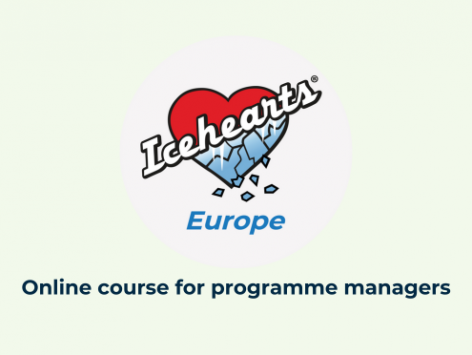
Welcome to our course “Icehearts Europe online course for programme managers” – A toolkit for building capacity for grassroots sports organisations to implement Icehearts Europe.

WHY SUCH A COURSE?
Are you a leader and manager in a local sports organisation? Have you engaged in or want to engage in delivering activities for vulnerable kids?
We are here to help you. The course will guide you on a journey to conduct an adaptation of the Icehearts Europe concept within your grassroots sport organisations.
We believe a joint effort is needed to address several health-related problems that children and youth face nowadays:
- Approximately 20-25% of youth suffer from mental health problems in the aftermath of COVID-19
- The long-lasting trend of insufficient physical activity for 80% of adolescents puts the health and wellbeing of children and youth at serious risk
Our online learning course is mainly targeting sports leaders and managers who will design and/or implement innovative approaches and use mentorship models for delivering grassroots sport activities to link vulnerable kids with social work.
Based on the experience and expertise of the Icehearts Europe partners and the lessons learned during the first 18 months of project implementation, this training tool has been designed to provide you with an actionable learning experience to build the capacity of your grassroots sport organisation to implement the Icehearts Europe approach.
Icehearts Europe is uniquely positioned to address the intersections of physical activity, mental health and physical health and deliver benefits in these fields.
Join us on this journey!
OUR PROMISE
By the end of the Icehearts Europe online course, you will be able to:
- Understand & Explain the challenges and benefits of adopting and implementing the Icehearts Europe model
- Analyse the pre-requisite and create an Icehearts Europe Implementation Plan for your organisation based on your context
- Identify, train and support your selected Icehearts Europe mentors in implementing their programme of activities
Disclaimer: The materials herein have been produced or are used as a part of an independent partnership Icehearts Europe and should therefore not be viewed as official materials or views of the Finnish organisation Icehearts ry.
Key information to navigate the course
- You will need up to 90 minutes to complete the course. This does not include the in-depth work you will need to conduct to implement an Icehearts Europe initiative – and which is suggested as homework through the course.
- Course materials including video transcripts, recommended readings, podcasts, and presentations are downloadable and included within each module.
- For each of the videos in this training, you can activate subtitles and auto-translation. To do so: 1. Click on the keyboard icon at the bottom right-hand side of the player to turn on the Subtitles/CC option + 2. Click on the gear icon (‘Settings’) and select in the Auto-translate tab your desired language
- After finishing each topic, click at the bottom of the page. This will help you know where you are (“Topic” will be marked with a checked icon in a green circle) and bring you straight to the next topic. Repeat the process with the module to mark your advancement.
- To finish the course you will need to complete all modules, take the test at the end to check your knowledge AND complete a quick feedback form.

